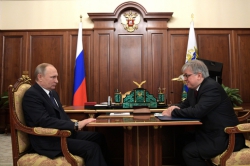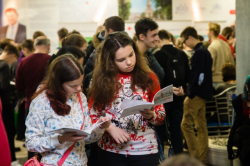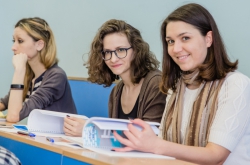Apart from ITMO, six other top-performing universities were mentioned in the first group. These are: Moscow Engineering Physics Institute, Moscow Institute of Physics and Technology, National University of Science and Technology MISiS, Novosibirsk State University, National Research University Higher School of Economics, and Tomsk State University.
Second group included First Moscow State Medical University, Kazan Federal University, Peoples’ Friendship University of Russia, Peter the Great St. Petersburg Polytechnic University, Tomsk Polytechnic University, Tyumen State University and Ural Federal University. Joining the third group were Immanuel Kant Baltic Federal University, Far Eastern Federal University, N. I. Lobachevsky State University of Nizhny Novgorod, Samara National Research University, Siberian Federal University, South Ural State University and St. Petersburg Electrotechnical University. The universities are listed in the alphabetical order in all of these groups.
According to the Project 5-100 official statement, such a classification implies a consequent differentiation in terms of financial support, or subsidies, provided by the state to each group of universities taking part in the Project.

Following a comprehensive evaluation process, the Council has put forward several recommendations aimed at helping the universities achieve better competitive performance, including the following:
Universities should focus on their main development priorities, placing special emphasis on pursuing priority research areas, which will help them gain international recognition as leading research and education centers. In doing this, the institutions need to factor in available resources and contemporary research trends, so that their competitiveness-enhancing goals are in line with the developments at the global education and research scene.
The Project 5-100 participants should also strive to review and update both their management system at large and their strategic management approaches to research, education and innovation, on an ongoing basis. This will allow them to keep up with the present-day development trends, as well as to expand their skill set in the field of management.
As it is important to increase the role of universities in regional development, the Council recommended that the participating higher education institutions step up their cooperation with the industry, including through the creation of business environment within universities and innovation ecosystems around them. It is also crucial that they pay more attention to the development of entrepreneurial education, one of the key factors needed for building an effective innovation culture both in the universities and in the regions.
The Council also encourages the Project 5-100 participants to develop their human resources. The universities should strengthen their research and teaching staff and increase the number of researchers, partly by attracting specialists from foreign universities.
Besides, the Council recommended the universities to place emphasis on the development of additional measures aimed at attracting international students, however it’s not only the quantity that matters, but the quality as well, as a high level of students’ education will allow the university to attain the reputation of a successful educational and research center whose graduates are competitive in the labor market both in Russia and abroad.

The session of the Council on Competitiveness Enhancement of the 5-100 Russian Academic Excellence Project was held on October 26-27, 2018 in Kaliningrad at the Immanuel Kant Baltic Federal University. In the course of two days, participating universities presented the results achieved so far and gave an overview of their future development plans.
ITMO University was represented by its Rector Vladimir Vasilyev, First Vice Rector Daria Kozlova, Vice Rector for Research Vladimir Nikiforov, Head of the Strategic Development Department Marianna Chistyakova, Head of School of Photonics Vladislav Bougrov, and Deputy Head of School of Computer Technologies and Control Sergey Kolyubin.
ITMO University, which has been one of the leaders among Project 5-100’s participants for the past several years, reported on its results and achievements and presented its plans for the future up to 2020. The key topic of this year’s presentation was artificial intelligence, and for a good reason. In 2018, ITMO University won in a grant competition organized by the Ministry of Science and Higher Education of the Russian Federation. The university took first place in the ‘Machine learning and cognitive technologies’ category.
To learn more about the session, click here. ITMO University’s presentations are available in Russian and in English.








